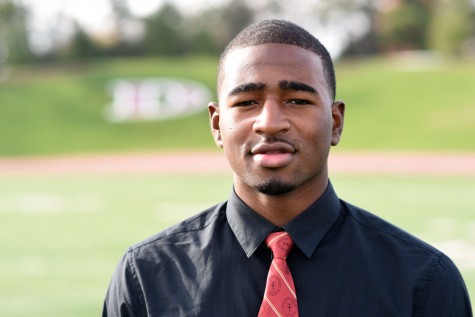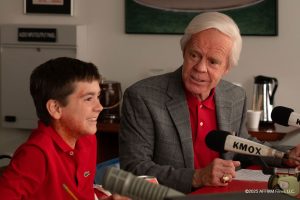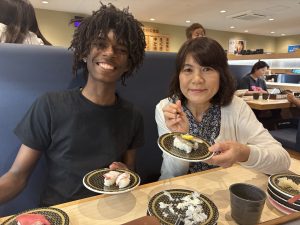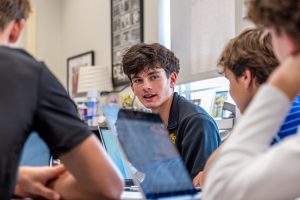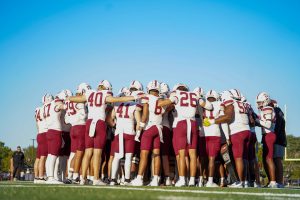Ferguson: More Than Mike

December 16, 2014
Unless your heritage has historically dealt with racism, you may not understand what is happening in response to Michael Brown’s death. Amidst the charred remains of cars and businesses and the repeated closings of department stores, highways and schools, there is a message. A message that addresses racial issues that have been swept under the rug since the election of our first black president and attorney general. A message that forces the most uncomfortable conversations. A message that resurfaced with Mike Brown: There is not racial equality in America.
To say that race doesn’t apply to this case would be foolish. The racial tension that resulted after the death of Michael Brown has left St. Louis and the country a mix of activists and bystanders. Many argue that the activists should become bystanders and place faith in the justice system. However, as history shows, African Americans don’t always receive the justice they deserve.
Regardless of what transpired in Ferguson, racial profiling by the police occurs across the country. Nationwide, study after study reports that blacks are disproportionately stopped by police. According to the state’s attorney general’s office, in Ferguson blacks are stopped and arrested four times more than whites, a frequency that does not correspond to the demographics of the neighborhood; nearly 70% of the Ferguson population is black. Studies confirm these findings are not Ferguson-specific.
African Americans, who don’t have faith in the system, feel it was never designed to protect them.
While unjust loss of black lives is not historically uncommon, some cases in particular have gained public traction. 1955: Emmett Till is inhumanely beaten to death and no charges are filed. 2013: Trayvon Martin is racially profiled and shot. Zimmerman is acquitted of charges. 2014: Eric Garner is choked to death, on camera. There is no indictment. While much has changed since Emmett Till, the same basic concerns persist today.
“It is perhaps healthy to remember that we are just a few generations from Jim Crow. That perspective reminds us of how far we have come. Yet we cannot allow that perspective to mute our fight for justice, our demand to keep raising the bar,” history teacher Mr. Peter Lenzini said.
In an age where social media and technology give everyone access to a public platform, there has been an outpouring of support and condemnation for the protestors. When the grand jury decided not to indict Darren Wilson, Twitter exploded. Even some De Smet students participated in arguments about race, further dividing our school.
Based on the tweets, students who live nowhere near Ferguson or never have been the target of racism only seemed to care about the things that were on fire and that people were looting. Multiple students mocked the “Hands up. Don’t Shoot.” movement by tweeting “Hands Up. Don’t Loot.” or “Pants Up. Don’t Loot.”
There is no excuse for the looting. It’s unfortunate and heartbreaking that a handful of people chose to use this movement as an opportunity for destruction and crime. However, the mocking and belittling tweets have created a feeling of division in our community.
Students need to be open to listening. In De Smet, this could be a simple text asking for clarification or having a class discussion about Ferguson. Conversing about the situation will help dissolve the emerging “us” and “them” division. As a school, we have taken steps to understand Ferguson through two thoughtful prayer services, but some felt like it wasn’t taken seriously by the students. The Diversity Committee has also hosted several listening sessions for the De Smet community.
For those who have dealt with racism, the grand jury decisions weren’t surprising. Most protesters knew no charges were coming but still held onto hope. A shared hope that emerged after more than 100 days of protesting and public displays. And there is still hope. It is in this hope that America can begin to reform the way it thinks and converses about race.
Spartans Respond:
“Racism has been going around way before Mike Brown, way before Eric Garner, way before Trayvon Martin.”-DeAndre Hayes’16
‘We never discuss race in this country until something bad happens.”-Bailey Stephens’16
“There has been a breakdown in the relationship between the communities and the police, and it’s problematic.” -Mr. Peter Lenzini
“Maybe the rioters and protestors should focus their time and effort onto black-on-black crimes, which is a much bigger problem than white-on-black crime.”-*student requested to remain anonymous
“There were certain people who were trying to be funny about the situation, when there is nothing funny about the shooting death of a teen and constant rioting. Also, many people who tweeted didn’t have much knowledge of the situation.”-Keenan Agnew ‘17
*Article written in December 2014*

